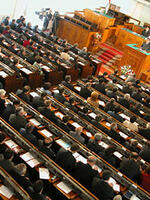Filter by...
Reset all
Publications (7)
Working Paper
pdf
– Across-region study
This study aims to examine the drivers of inequality of opportunity in health outcome among children below 5 years of age, using the Sudanese 2014 Multiple Indicator Cluster Survey. It investigates the variation in inequality across and within regions, decomposing inequality into a portion that is...

Effective and capable states are essential for the achievement of the Sustainable Development Goals (SDGs). Such states can raise the necessary resources for spending on the crucial government programmes that matter for the achievement of the SDGs, as well as implement these programmes efficiently...
Blog
– An Interview with Andy McKay
25 February 2013 Andy McKay, professor of development economics at University of Sussex, discusses the motivating factors behind UNU-WIDER’s Growth and Poverty Project (GAPP) with Carl-Gustav Lindén, senior communications specialist at UNU-WIDER. In the GAPP project Africa’s growth, poverty and...
Journal Article
– A Scenario of European Union Relations with Sudan
This paper investigates the economic consequences of a scenario in which the European Union (EU) imposes economic sanctions on Sudan. The idea of the paper is motivated by the deteriorating relations between Sudan and the EU arising from the devastating conflicts in Darfur region and related...
Book Chapter
From the book:
Identity Politics and Women
Displaying 7 of 7 results
 Join the network
Join the network